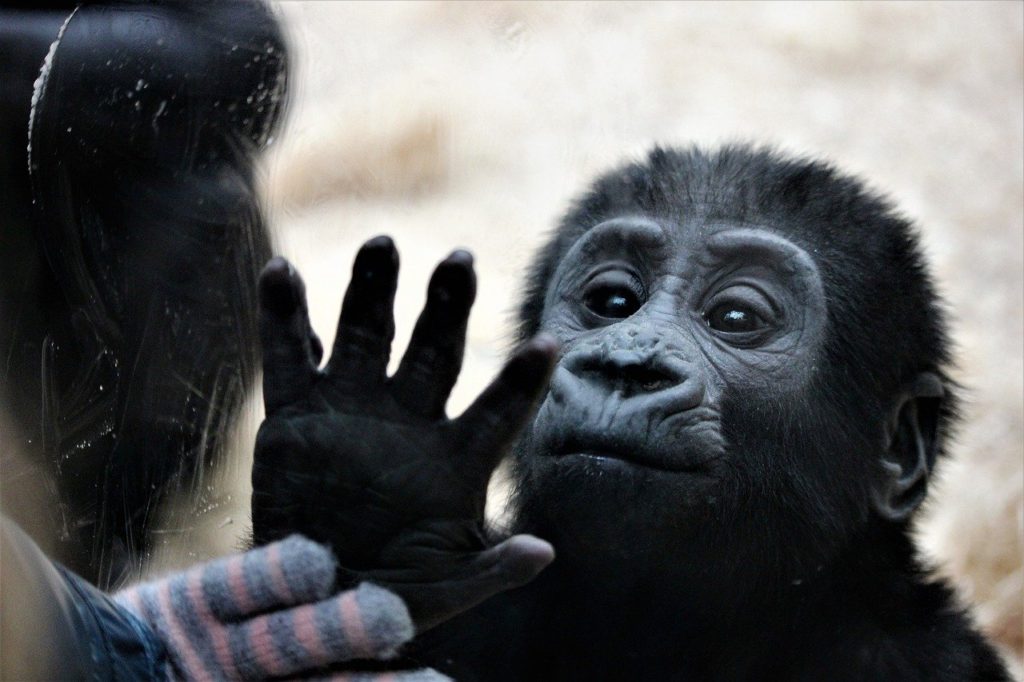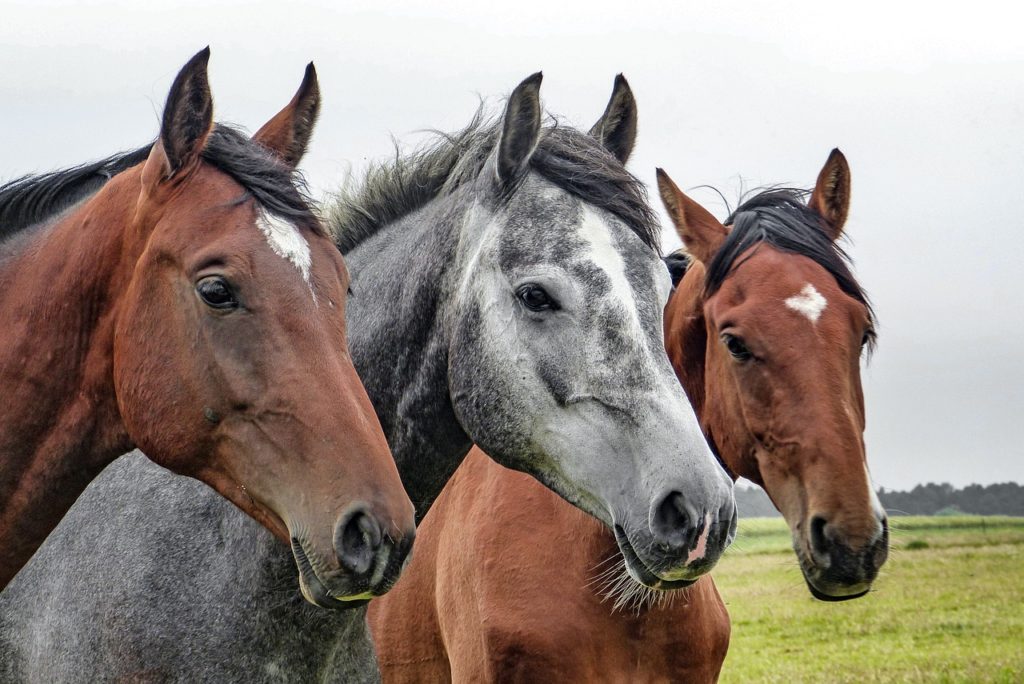Do Animals Qualify for the Afterlife?

Human beings love setting up “us vs. them” divisions, with us on one side and the animals on the other. Traditionally, we’ve done that in three ways – claiming either rationality, emotional life, or morality as our special province.
We said, “Human beings are the rational ones; animals are just dumb brutes.” Or, “Humans have deep feelings; animals are just reflexive automatons.” Or, “Humans are the moral ones, made in God’s image. Animals are driven by instinct; they are amoral creatures, without any sense of right and wrong.”
Based upon these “us vs. them” categories, we gave ourselves souls and the afterlife, and we denied them to animals.
These sort of distinctions have been made for millennia, and for good reason — they make us feel better about ourselves. However, over the past 30 years, research in animal cognition has overturned all of them.
Let me give you a brief overview of that. As we go, keep in mind that these are supposedly unique human attributes, and that these distinctions are used to deny that animals have souls and an afterlife existence. If the attributes are not uniquely human, then the rationale for excluding animals collapses.
Animals Are Intelligent
Over the past 30 years, it has become increasingly clear that rationality – once thought to be a uniquely human attribute – is something animals possess as well. The hallmarks of reason have been demonstrated in many animals — primates, wolves, dogs, birds, and mice, to name a few.
Animals classify and categorize objects, much like we do. They learn from each other’s mistakes. Many species use tools — the more we look, the more we find. Even alligators and crocodiles have gotten in on the tool act. And although we thought hunting tools were uniquely human, that has turned out to be false as well.
Self-awareness was also thought to be a uniquely human attribute, but nope — chimpanzees, dolphins, elephants, and dogs (when tested correctly) have all been shown to demonstrate self-awareness. That is, they have a sense of their own personal identity and individuality.
Contrary to the stereotype of animals only being oriented to the “now,” many animals have a future orientation. That is, they think ahead — they contemplate the future, and they think before they act. They weigh the possible effects of their actions before proceeding.
Animals have sophisticated languages. No, they don’t have symbolic language — that does seem to be uniquely human, our “superpower,” so to speak — but animals have complex and intricate communication systems, some of which we are only beginning to decode. So the possession of language is not uniquely human.
A note about intelligence: Every species has its own niche, with specialized information processing systems adapted to that niche. A dog is smart in exactly the ways a dog needs to be smart, not in the ways a bat, dolphin, or human being needs to be smart. Many animals’ so-called “failures” on intelligence tests in the past were actually our own failures, because we were testing them using our standards and our preferred modes of information processing. When we adapted our testing to their preferred modes — lo and behold, turns out they are actually really smart. They are just smart in their own ways, not ours. For more information, see Frans De Waal, Are We Smart Enough to Know How Smart Animals Are?
The idea that human beings are the only species with rationality is false. It is a matter of degree, not a “present vs. absent” distinction. You won’t see a monkey running a quantum physics or philosophy department any time soon, but we can’t ignore the burgeoning data about animal intelligence.
Animals Have an Emotional Life
You are probably saying, “Of course they do,” but there was a time, and not too long ago, when animals were thought of as lacking any real emotional life. They were seen as driven by only by reflex. Any appearance of emotion was dismissed as merely automatic behavior, with no meaning.
It seems absurd to think this way — anyone who has known an animal in any depth knows they have feelings — but these ideas held sway for a long time, for millennia, up through the 1950s and 1960s.
We now know that animals have most of the same feelings human beings have. The evidence for this is overwhelming. It has been piling up for decades and continues to accumulate.
Animals have all of the basic, fundamental emotions – happiness, sadness, disgust, fear, anger, and surprise. We see all of this — joy in rats, sadness in elephants, fear in dogs, anger in chimps, surprise in apes. If you compare our brains, you’ll see clear similarities in the structures governing emotional life, so this isn’t surprising.
Beyond just the basic emotions, animals also show evidence of more complicated feelings — regret, longing, jealousy, and revenge, for instance. Or, empathy and compassion — that has been shown in a wide range of species, even mice. Animals experience grief as well, elephants being the most famous for this. Animals feel for each other, and they console each other when they are hurting.
There is no question that animals suffer and feel pain. They get anxious and depressed. They show symptoms of post-traumatic stress.
Animals have close, affectionate bonds, not just within their own species, but across species. You even see it between species that would normally be predator and prey. For instance, a zookeeper gave a snake a hamster for dinner, but the snake ended up befriending the hamster instead.
Animals are fun-loving. They have a sense of humor. There is a part of the human brain associated with laughter, and you can see similar neurological structures in some animals. You can hear a dog “laugh,” if you know what to listen for.
Some animals even show something akin to embarrassment. Here’s a story from Marc Bekoff about a cocky monkey:
After mating with a female, the male strutted away and accidentally fell into a ditch. He stood up and quickly looked around. After sensing that no other monkeys saw him tumble, he marched off, back high, head and tail up, as if nothing had happened.
Marc Bekoff, The Emotional Lives of Animals
Animals have rich emotional lives. The more we learn, the more their emotional lives seem to resemble our own. Because of our neocortex and symbolic language, the emotional life of a human being can be more complicated. But the basics are the same.
“There is every reason to believe many animals feel just as many emotions as humans do.”
Marc Bekoff
The old distinction — that human beings have deep emotions, but animals are just creatures of reflex — is completely false.
Animals Have Morality
The last area where humans have tried to erect a blockade to the afterlife is in the area of morality. Everyone knows that human beings are moral creatures, and animals are amoral — just living to eat, survive, and reproduce, right?
Well, no. Over the past 20 or 30 years, evidence of what can only be called moral behavior among animals has accumulated. I’ll give you a few examples. If you’d like to read more, see Wild Justice: The Moral Lives of Animals, by Marc Bekoff and Jessica Pierce.
Most mammals and some birds have demonstrated empathy. That’s important, because empathy is at the root of moral behavior. Empathy is the basis for compassion and concerns about justice.
Many species extend care and assistance to another animal, including members of a different species — that is, when there is absolutely no biological advantage for them to do so, and they might even be putting themselves at risk. Animals show concern for others and will help each other out of trouble — even strangers. They show compassion and concern towards other animals who are suffering or experiencing grief. They console each other. They offer aid to each other and build relationships of trust. We see evidence of “pay it forward” behavior, even in rats.
Animals have a sense of fairness or justice. They have implicit rules about sharing and equity — who deserves what. They have rules about fair play. They value honesty and reciprocity. They have codes governing forgiveness.
That’s not to say animals always behave morally, any more than human beings always behave morally. Animals can be immoral and cruel on occasion (though cruelty is rare). But animals do have moral codes, rules about what is right and wrong. For the most part, they abide by them. Despite the stereotypes of aggressive chimps, studies have shown that 93% of primate interactions are positive and prosocial.
Obviously, animals lack the very elaborated moral systems that humans have, by virtue of our capacity for symbolic language. We shouldn’t nominate a monkey for the Supreme Court. The point is, these are differences of degree, not all/nothing categories. We can see the same types of moral concerns in animals that we have ourselves — empathy and compassion, rules about fairness and justice, cooperation and reciprocity.
The idea that human beings are the only ones who have a moral compass – that idea has gone out the window in the last 20 or 30 years. Animals are also moral creatures.

Conclusion
One by one, each of these “us vs. them” distinctions has fallen. We can no longer say that human beings are the rational ones, and that animals are dumb brutes. We can no longer claim that human beings have deep feelings but animals do not. We can no longer abrogate to ourselves the whole realm of morality and pretend that animals are amoral creatures driven only by instinct and competition.
All of those hard and fast distinctions between animals and humans have collapsed in the face of the evidence that has been accumulating for the past 30 years. And the evidence continues to accumulate.
Remember where we started — these are the distinctions that have been used throughout history to deny that animals have souls and an afterlife. If these distinctions don’t hold up — if these attributes are not uniquely human — then the rationale for denying animals souls and an afterlife also collapses.
2 thoughts on “Do Animals Qualify for the Afterlife?”
Super article, totally agree, we only need to look to the domesticated animals to see for ourselves and as you say studies show what man so blindly would not see. Although I do hope that some day those who kill for thrill meet their match. I say this as I have just seen a photo of two men proudly grinning with guns who have killed a baby elephant. The impact of which will be known for generations in her/his little family.
Yeah, that’s sad, to celebrate thrill-killing like that, especially of a baby elephant. It’s hard to imagine being proud of something like that. Do they think they have accomplished something brave and courageous, to shoot a baby elephant with guns? Big men!
Here’s a video of men rescuing a baby elephant. Something to genuinely be proud of.
https://youtu.be/lEDHRh8gfm8
Comments are closed.